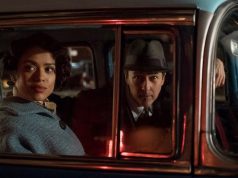One of the most boring things in the world is listening to someone else talk about a dream he or she had. Unless you were in the dream, or unless you can actually re-live the dream yourself, there is simply nothing to hold your interest in hearing about it. It’s like attending a funeral for someone you didn’t know. You get the idea this is a big deal for the people involved, but it’s all pretty meaningless to you.
Dreams don’t follow the rules of storytelling. The plotlines are rarely sensible, things happen for no reason, and there is seldom any kind of satisfying resolution. The dreamer finds them interesting because they contain tidbits of his or her real life, but that connection obviously doesn’t extend to other people.
I mention this because David Lynch’s “Mulholland Drive” is a lot like a dream. It’s random, it makes very little sense, and it refuses to answer most of the questions a viewer might have. Roger Ebert praised the film for these very reasons, saying:
“Individual scenes play well by themselves, as they do in dreams, but they don’t connect in a way that makes sense — again, like dreams. The way you know the movie is over is that it ends. And then you tell a friend, ‘I saw the weirdest movie last night.’ Just like you tell them you had the weirdest dream.”
But as I said, your friend isn’t going to be interested in hearing about your dream, and I can’t imagine anyone honestly being interested in watching David Lynch’s dream-on-film, either.
I find it amusing that Ebert liked the movie for all the reasons I disliked it. If I had read his review without having seen the movie, I would have thought, “Wow, this sounds awful.”
Since Ebert doesn’t have a real sparring partner these days (Roeper who?), I’ll presumptuously put myself into the chair Gene Siskel once occupied just for this one review, and then I promise I’ll leave before Roger calls security. (The complete text of Ebert’s review can be found here.)
EBERT: “The less sense it makes, the more we can’t stop watching it.”
SNIDER: I disagree. Nonsense is fun for a few minutes, but not for 2 1/2 hours.
EBERT: “The movie is hypnotic; we’re drawn along as if one thing leads to another — but nothing leads anywhere.”
SNIDER: In other words, it’s a bait-and-switch, a frustrating lesson in movie tedium. You put a bunch of intriguing ideas on the screen to pique our interest … and then intentionally leave them unresolved! Hooray for you, David Lynch, you brilliant, pretentious man, you!
EBERT: “‘Mulholland Drive’ isn’t like ‘Memento,’ where if you watch it closely enough, you can hope to explain the mystery. There is no explanation. There may not even be a mystery.”
SNIDER: And you consider this a selling point, Rog? “Mulholland Drive” isn’t like “Memento” because the latter is one of the best films of the year and the former is merely a smug attempt by Lynch to see if people will proclaim him a genius just because they’re afraid to admit they didn’t get it.
EBERT: It “lingers over what it finds fascinating.”
SNIDER: In other words, most scenes drag on too long. I love a lot of David Lynch’s work — the “Twin Peaks” episodes he personally wrote and/or directed are my favorites in that series, for example — but the guy is self-indulgent to the point of irritation. For crying out loud, if nothing’s happening, quit showing it to us.
EBERT: “This movie doesn’t feel incomplete because it could never be complete — closure is not a goal.”
SNIDER: Again, you think this is why people SHOULD see it? A movie that doesn’t even TRY to mean something, that doesn’t even TRY to explain itself, that doesn’t even TRY to make sense? Saying, “Closure is not a goal” is like saying, “Coherence is not a goal,” or “Satisfying the audience is not a goal,” or “Logic is not a goal.”
EBERT: “If you require logic, see something else.”
SNIDER: O that I could!
I will say now what I like about the film. Lynch’s insistence upon stylized acting is always a treat; one is never sure whether he’s honoring the simple burger-at-the-malt-shop fare of the 1950s, or satirizing it. Laura Harring and Naomi Watts are both good as the heroines, Harring as an amnesiac who is wanted by a variety of people in Los Angeles, and Watts as a fresh-faced Canadian girl hoping to make it big in Hollywood. Billy Ray Cyrus has a cameo, and Ann Miller plays a significant role. Justin Theroux has some very funny moments as a film director being told to re-cast his lead, and being told this by a mysterious cowboy. I also laughed a lot at a calamitous scene in which a hitman tries to quietly dispatch a victim.
And there are some gloriously exciting ideas, dealing with identity and reality and celebrity. Some scenes, by themselves, are funny, beautiful, poetic and surprising, all punctuated by Angelo Badalementi’s Gothic-synth musical score. If I had any hope the movie could be unraveled by paying careful attention to it, I’d watch it again and try to figure it out. I’m certainly not saying a film shouldn’t be evasive or difficult to grasp, because those are often the most rewarding ones. But as Roger already told you, there’s no chance of understanding this one, no matter how hard you try. The movie doesn’t want anyone to understand it. To make sure of that, it removes several key pieces before it even hands us the puzzle.
C- (2 hrs., 26 min.; )





